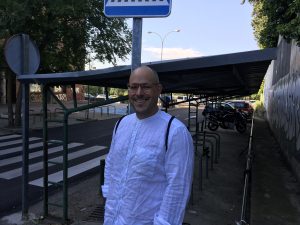
On the afternoon of September 10th, our colleague, Christian Wilhelm, from the Institute for Social Sciences at the Humboldt University (HU) in Berlin was here on the UNC-CH campus. He spoke to students in our Excel Working-group on Refugees, Europe, and Service Learning (WRESL) as well as to a few assembled TAM students about the Berlin Track of the German-Turkish Master’s Program (GeTMA) at HU. Christian discussed the process through which a new track of the program was formed three years ago in order to enable refugees from such places as Syria, Afghanistan, and Tanzania to enroll in a two-year English-language course of graduate study at HU. This track of GeTMA has made it possible for TAM students in Berlin to study alongside a very diverse, motivated, and informed set of classmates. It was especially interesting to hear about Christian’s motivations and inspirations for starting this track.Christian has perceived how important it is for individual refugees in Berlin to join communities, engage in intellectually challenging pursuits, maintain routines, and be perceived as participants just like any other individuals. GetMA’s Berlin track now provides that opportunity. We are eager to see what the initial graduates go on to do with this degree.
One of our Excel students who is a WRESL member, Kellan Robinson, provided her reflections on the session with Christian:
“I believe that the best way to expand your worldview is to learn from the experiences of others. Cross-cultural exchange is key to understanding the varying circumstances and issues that impact one’s life. Through conversation, I am able to learn the nuances and dimensions that make someplace or someone unique. The knowledge that I gained from WRESL’s meeting with Christian Wilhelm, from the Humboldt University in Berlin, is an example of this power that cross-cultural conversation has.
Through listening to his experiences, I came to the conclusion that Christian represents the vital role that individuals play in refugee integration and assistance; this, in juxtaposition to the duty and the actions of the state. I found it thought-provoking to listen to the observations and reflections of a German who ‘lived through’ the 2015 refugee crisis. In my opinion, personally hearing a lived experience is more impactful than reading a quote in an article.
Christian discussed his experience teaching language classes in one of the “camps” in Berlin that was situated in a former city department store. Christian referred to this setting as “a city in the city.” I found this quote interesting in the way that the camp both functions as a city and is a world separate from mainstream Germany. Furthermore, from this conversation about the dynamics of the camp, I think it would be intriguing to study how national conflicts are transferred to an individual level. How would one describe the interaction between individuals from conflicting nations who are living under one roof?
Christian also shared the experience of one Tanzanian refugee-student and explained the difficulty of her asylum claim on the basis of her sexuality. This example makes me want to examine the often overlooked experiences of LGBTQ refugees.
One of the most subtle, but thought-provoking segments of our meeting was when Christian nonchalantly explained that “one of [his] friends just became German” and a TAM student, Madelon, spoke of a family member who ”just became Dutch.” I found their use of language interesting in relation to how different populations perceive citizenship and nationality, because they used different phrasing than what is used in the United States. In the U.S. phrasing around nationality is similar to the following: “they are now an American citizen” or “they are naturalized.” Thus, it was interesting to hear the phrasing of someone gaining citizenship as them becoming truly a part of the nation; “German” rather than just a “German citizen.” The conversations around citizenship, nationality, and ethnicity will become increasingly important over the next decades as Europe is altered by immigration.”
Another Excel student and WRESL member, Cameren Lofton, wrote this text in response to the session:
Talk with Christian Wilhelm:
Hearing Christian Wilhelm talk about his experience with refugees and the influx of refugees in Germany was especially enlightening. It demonstrated to me that academics are not resigned to remaining in the ivory tower but can exercise great change within their community through their positions. With the help of Wilhelm and his colleagues, many refugees were able to continue on with their education, a contrast to the many refugees who often have nothing to do except wander aimlessly due to German asylum laws that restrict them from working or attending college. Wilhelm’s stories highlighted the often-overlooked fact that these refugees are coming to the country with experiences and knowledge that many of them never get to use.
For example, his story about the refugee fleeing Tanzania because of LGBTQ discrimination resonated with me because these are the stories that are less often heard. I believe that it is important to remember the people who are still being persecuted in countries that are not seen to be as “dangerous.” Furthermore, he pointed out how many refugees have educational experience in Political Science and other social sciences and humanities but were encouraged to focus more on STEM fields in their home countries; through the GeTMA Berlin program, they are able to renew interest in fields from which they were previously dissuaded.
Most importantly, Wilhelm’s program humanizes refugees by treating them as individuals rather than an invading mass of people. By offering them opportunities that meet their specific academic interests, this program proves that the life of a refugee does not have to and should not be just sitting in a refugee center with nothing to do.